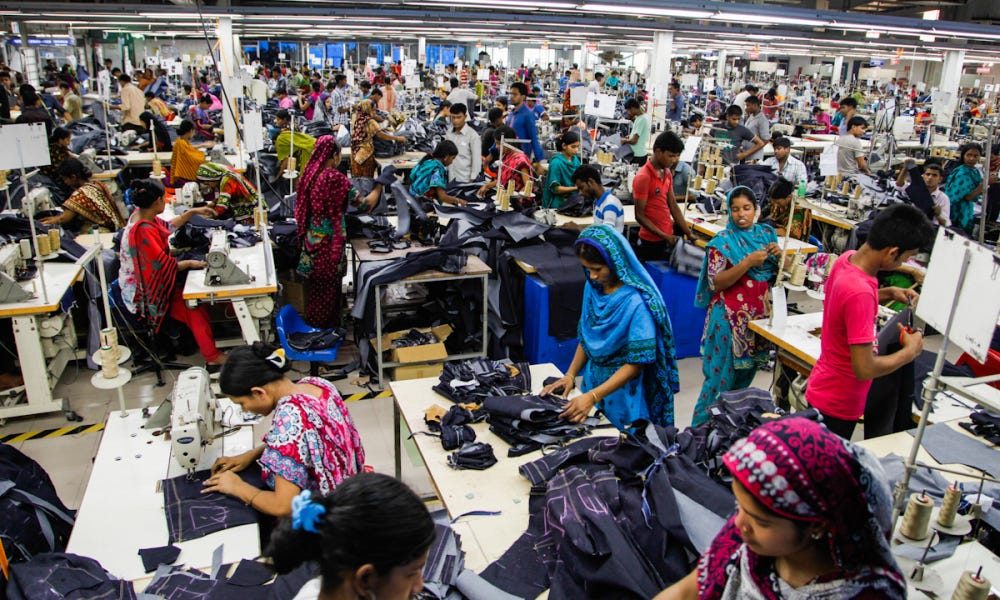Is Workwear Made In Sweatshops? What To Look Out For & How To Be Safe
There have been numerous reports in the media about some UK clothing factories underpaying workers and maintaining unsafe working conditions. According to a report by the UK Parliament's Environmental Audit Committee, some UK garment factories have been found to underpay workers and operate in poor conditions.
In this article, we will address whether UK workwear is made in sweatshops, what to look out for to spot exploitative production techniques, and how to make ethical purchases when buying workwear.
Is Workwear Made in Sweatshops?
Generally, workwear is not more likely to be made in sweatshops than other types of clothing. Ethical Consumer highlights that the likelihood of clothing being produced in sweatshops does not necessarily depend on the type of clothing but on the practices of the companies producing them.

However, if the prices seem unusually low, you should approach custom workwear and uniform garments with the same caution as regular clothing.
Some may assume that workwear is made in sweatshops because it can be cheaper than similar fashion items. For instance, workwear t-shirts might cost less than similar quality fashion t-shirts, but this does not necessarily mean they were made in a sweatshop.
Workwear does not follow traditional fashion trends or the rapid changes driven by social media. This means that workwear products have more longevity and can be produced in larger quantities, reducing production costs. Additionally, workwear often involves simpler designs and fewer intricate features, which also helps lower costs.
Therefore, budget workwear items may be cheaper because they are made simply and for straightforward purposes. However, specialised workwear with features like reinforced knees or safety toe caps may cost more due to their higher quality and durability.
In conclusion, the low cost of some workwear does not mean it is made in sweatshops.
Sweatshops in the UK
Do Sweatshops Exist in the UK?
Compared to the horrific conditions in sweatshops in South Asia or the Far East, the UK does not have sweatshops in the same way. However, there are highly illegal, unsafe, and exploitative clothing factories and distribution centres in the UK.
Reports by organisations such as Labour Behind the Label and the UK’s Health and Safety Executive (HSE) have documented unsafe working conditions and exploitation in UK clothing factories and distribution centres.
What Are UK Sweatshops Like?
UK sweatshops often pay below the legal minimum or living wage. Workers may face harsh discipline and working conditions. For example, a Channel 4 Dispatches investigation in February 2017 uncovered that some workers in UK clothing factories were being paid as little as £3 per hour, well below the legal minimum wage .
Additionally, UK sweatshops can be unsafe, with highly flammable clothing stored haphazardly and workers operating hot irons and machinery nearby. Overcrowding in these facilities can lead to blocked fire exits and escape routes, contributing to 5,500 fires in UK retail distribution and industrial workplaces in one year.
Consumers should be aware that cheap clothing often comes at the expense of exploited workers. A "Made in the UK" label does not always guarantee ethical production. Here are some tips to ensure your workwear items are produced ethically.
How to Avoid Clothing Made in Sweatshops
Cheap is Not Always Good
Cheap items do not always indicate unethical production. They could be old stock, part of a clearance, or slightly damaged but produced ethically. Conversely, an item could be cheap because of worker exploitation. Use other factors to help judge if the price seems too good to be true.
Check Internet-Based Supplier's Credentials
If the price of items on a supplier’s site raises concerns, check their credentials. Ensure the website is secure, indicated by a padlock symbol in the address bar and 'https://' in the URL.
Look for reviews on Google Shopping to see if the site has been flagged as dangerous by previous customers.
Reputable companies should feature positive customer feedback and have a clear contact page with social interaction options, opening hours, an address, email options, and telephone numbers. If a supplier operates unethically, they are less likely to be open about their policies.
Actively Buy Ethically Produced Items
Many manufacturers ensure their production processes are fair and proper.
While it has become standard to produce clothing ethically, a quick question to your supplier should reveal if their supply chain operates ethically.
You may also find Anti-modern slavery & Human Trafficking policies, Ethical trading policies, and Environmental policies on company websites. If you don't, you should certainly ask for them.
Check Supplier Policies on Ethics and Health & Safety
If you have concerns about a supplier, ask to see their policies on ethics and health & safety. A responsible retailer will expect their suppliers to adhere to ethical standards and procedures, ensuring safe and fair working conditions throughout the supply chain.






